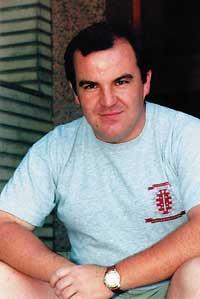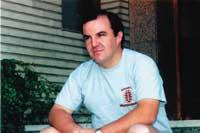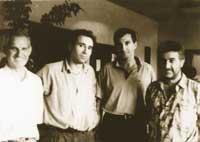Mikel Aizpuru: “UEU will continue to be the meeting point Basques”
Zetiaz-Elhuyar: Since when does Mikel Aizpuru work at the Basque Summer University?

(Newspaper)
Mikel Aizpuru:
I already knew him, but since the spring of 1986, more or less, I have participated directly in the structure of the EU. So, on the occasion of the fiftieth anniversary of the Spanish Civil War, we met a group of students from the Faculty of History of Vitoria to organize a course in this regard and I took care of it. There I saw myself, when I was 23, UEU History Advisor.N-D: Since its creation, the Basque Summer University has had and has as its main objective the integration of Basque and university. After 25 years, more and more people participate in summer courses, in what steps is the EU on its way to achieving?
M. A. I don't think there is a direct relationship between the number of students currently in the EU and their place in society. I believe that this place will be based on the Basque language and the situation of the university. Although summer courses still require consolidation work, we should try to prepare actions that will take place throughout the year for people to know.
N-D: One of the main objectives of the EU is to work the way towards a university that works entirely in Basque, but in Euskal Herria there are universities that give a place to Basque. What relationship do they have with other universities?
M. A. The situation is normalizing, each maintaining its principles. With the UPV-EHU and the UPNA we increasingly have better relations and contacts with the University of Navarra. Many teachers and students have approached from Deusto, but as an organization we do not have much contact. It is clear that the courses organized by the EU have full recognition of universities; for example, the recognition of students as free choice credits is a clear example of this.

N-D:
Last year the UPV approved for the first time several EU courses as free choice credits. It is noted that the courses were being held in Pamplona, so it does not seem to directly influence the large number of students last year. Will more students approach this year when renting credits?M. A. We believe that in addition to the UPV/EHU, the UPNA will standardize the summer courses. In any case, many of these students will only come in search of the title and not, like others, to satisfy their “curiosity”. It remains to be seen, we do not know what will affect the operation of the courses.
N-D:
After 25 years, the Basque Summer University tries to maintain the consolidated objectives. Has nothing changed all this time?M. A. From its creation to the present, the situation has changed a lot within the Basque Summer University. In any case, they follow the basic reasons that prompted the creation: the use of Basque is not fully normalized in the university, as is obvious. However, these conditions have changed over the years and this evolution forces us to seek new directions in the work of the EU.
N-D: And if we could ever see this situation, that is, if the Basque language was completely normalized in the university, would the EU disappear?
M. A. No, because the function of the UEU is not only the normalization of Basque in the university, but it is also a meeting point for many Basques working in the field of science outside that institution. What is your place? The EU cannot repeat in its courses the topics that have been seen in the normal classes throughout the year, and even less knowing that in some cases these issues are also taught in Basque. We would have to go to discuss new topics or organize graduate courses that can be held throughout the year.

N-D: In this evolution, and at the time of taking steps forward, many of those who have known the trajectory of the EU, could you think that this initial environment has changed radically?
M. A. Note the following data: In 1973 a single course was taught with a total mixture of philosophy, history, physics and linguistics. This year between Pamplona and Bayonne there will be about 30 courses, mostly around a specific scientific field. This has meant that when organizing the courses the bureaucracy has grown a lot and that we increasingly need more people and more money to prepare it. On the other hand, the collaboration of the early years, the interdisciplinary confusion and the atmosphere of fraternity has been lost in part, although compared with other summer courses is much greater.
N-D: How would you like to celebrate the 50th anniversary?
M. A. At the last General Assembly, a partner pointed out that it would be a bad sign to celebrate the 50th anniversary, which would mean a breach of the objectives of the EU. The most beautiful celebration would take place within a university that would function entirely in Basque, since the main objective of the EU is to help accelerate its creation.





